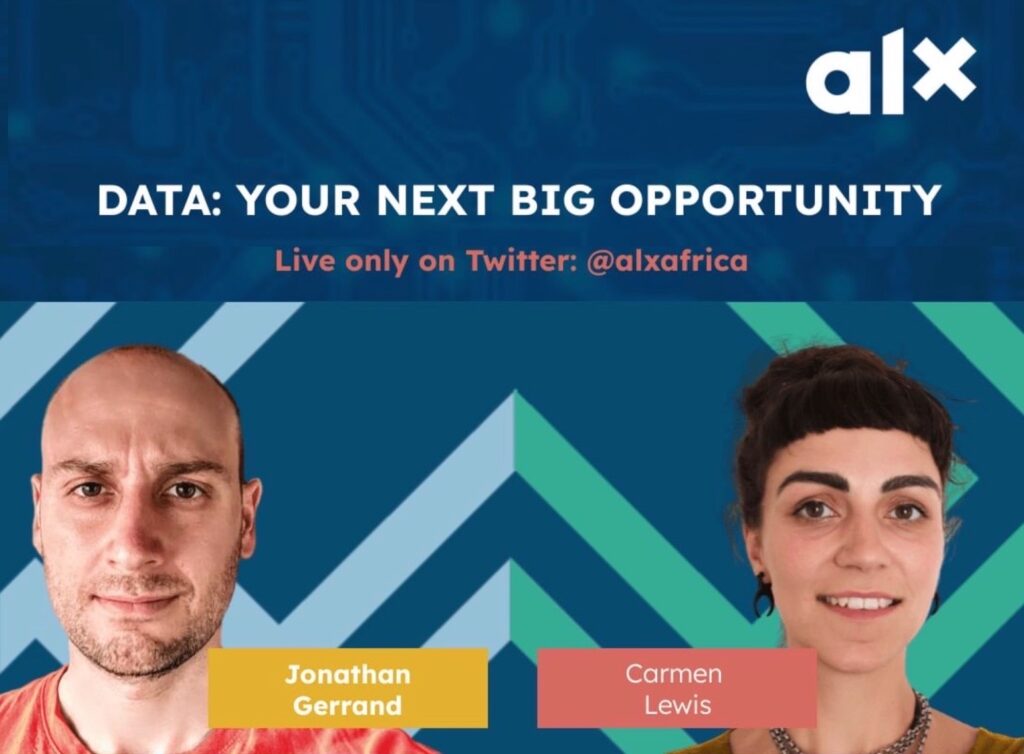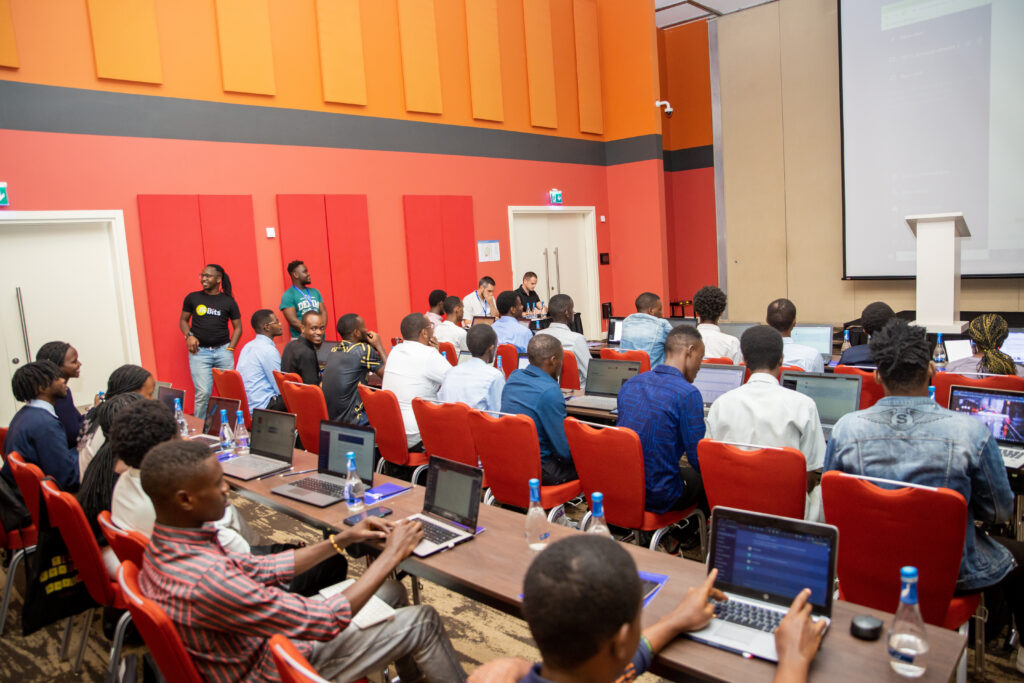What It Takes to Succeed in an ALX Data Programme
- 11 Apr 2023
- 10 min read

ALX recently hosted a Twitter Spaces conversation with ExploreAI to discuss all things data. Hosted by Brand Digital Lead at ALX, Kuda Mangwe, the purpose of the chat was to discuss two of the newest ALX courses – Data Science and Data Analytics – developed in partnership with ExploreAI Academy.
ExploreAI is a data company that uses advanced techniques in AI, cloud, and data engineering to solve business problems and advance industries in this new era of big data. Its learning institution, ExploreAI Academy, provides access to data engineering and data science education for people across Africa to help them upskill and build careers in data.
Kuda was joined by Carmen Louise, Head of Curriculum at ExploreAI Academy. She is responsible for building the coursework for the ALX Data Science and Data Analytics courses. Her main focus is to ensure that everyone participating can future-proof their skill sets in data for a long, fruitful career. Kuda was also joined by Jonathan Gerrand, Senior Data Scientist and Tech Lead of the product arm of Explore Utilities at ExploreAI.
The conversation highlighted how massive the data industry has become, with companies small and large using Big Data to influence modern ways of doing business. During the discussion, we delved into the differences between data analytics and data science, answering key questions like:
- What is it like working in the data industry?
- What does it take to be successful in the data industry?
- What skills are needed to become successful in this industry?
- What course(s) are the right path for someone looking to kickstart their data career?
Catch up on part 1 of the conversation here, and find a condensed recap, with key highlights, of part 2 of the Twitter Spaces conversation below.
Q: How are the ALX-ExploreAI Data Science and Data Analytics courses delivered?
Carmen: We aim to provide skills that are relevant and future-proof. That’s a big part of the data analytics and data science courses. In our technical data analytics programmes, we really get into structured query languages (SQLs), spreadsheets and dashboards. These are the fundamental basics that any data analyst should definitely know about.
For our 14-month technical data science programme, we get into Python and how we can leverage that to do regression, natural language processing, classification, and unsupervised learning. Then we kick off with the foundations of cloud computing.
All of the content is self-paced and all of the learning material is delivered by our learning management system, Athena. We also post announcements and webinars on that same platform and have communities and FAQs where you can get administrative and academic support.
There are also opportunities to engage with peers, which happen in these online community platforms and in the city hubs. This is an important part of keeping data science and data analytics alive. Chances are, you are going to work in a team of data scientists, data engineers, and analysts, so it’s a perfect opportunity to practise those skills.
Q: What is the commitment that one needs to have to succeed in the ALX Data Analytics and Data Science programmes?

Carmen: On paper, the commitment for both courses will be 30-40 hours per week, and that will be true for the first two modules of each course. When you get into SQL, Python, and machine learning, we often see 50-70 hours. These figures can go up because more frequent practice helps cement the knowledge you learn. The main way to succeed in these courses is to practise, practise, practise! It ends up being your responsibility to decide whether you just want to spend the 30-40 hours on paper, or to say, “I really want to become a brilliant data scientist or analyst at the end of these courses.” Naturally, the latter would require a bigger time commitment.
Q: When I finish one of the courses and put the certificate on my resume, what can I confidently tell an employer I am qualified to do?
Carmen: Well, this would definitely speak to the skill set you’ve acquired. Being able to build a dashboard, perform machine learning, use Python – those are the skills the courses provide. Two things we prioritise in our space are having a portfolio that greatly boosts your CV and getting your name out there, showing people what you can do first-hand.
Data science, for instance, is a relatively new field, and there aren’t a lot of people with the requisite skills. By completing the course, you will have the opportunity to develop and demonstrate your mastery of these skills. This evidence of proficiency is what potential employers will be able to see when they look at your CV.
Practically speaking, the courses give people the opportunity to solve real problems, whether you’re starting out in the field or in a more experienced role. We teach critical skills, which apply to making a real impact. Data processes can be messy, but we want to teach people how to take complex problems, break them down into smaller pieces, and solve those using our data skills. So if you’ve taken either of these courses, you can say, “I know how to solve data problems with data skills and tools.”
Q: What kind of success rate have graduates from these data courses had in the job market?
Gerrand: We believe in a virtuous cycle at ExploreAI, so some of the graduates of a similar course that we provide have come to work with us. I have actually had the privilege of working alongside some of these graduates, and I have been thoroughly impressed by their skills, having worked in the field of data science for quite some time myself.
As Carmen mentioned, there is a big emphasis on practical data science and data analytics skills in these courses, which take more than the point-and-click method to achieve successfully. I can happily testify to the skill set that many of the ExploreAI graduates have.
These courses will definitely set you up for success, keeping in mind the testimonials that we’ve had from some of our employees. So I do think that if you put in the effort in this course, you’ll be set on a successful trajectory for your data career.
Q: What advice would you give to someone about passing these programmes with ALX?

Carmen: It’s actually a very simple answer, and I have said it before: practise, practise, practise! Another very important part of this is to engage with your community and learn from your peers. Set up coding sessions where you review each others’ dashboards and see how each other solves problems. That is one of the best ways to learn.
We teach you the skills and tools to be data analysts and data scientists, but for you to really believe you are one and get the most out of this exciting career path, you have to keep learning and practising. It’s an ever-evolving field so you just have to get into it and practise.
Gerrand: By opening yourself up to curiosity, you will have an advantage here and spur the desire. You will feel enthusiastic to share what you’re doing with your peers and be amazed by the things you’re able to do with your newfound knowledge and skills. It's an exhilarating and mind-blowing experience!
Q: Once you choose a module, will you get exposure to an actual, real-life project as you study?
Carmen: The one thing to remember is that real-world problems are complex. What we do is take real-life problems from our business side and adapt them for learning activities.
Data analytics has an integrated project, for example. You learn how to clean and process data in spreadsheets, then query it using SQL and, in the same project, you build a dashboard in the third module. Throughout the course, you’re building on your knowledge, which is imitating how that process actually works in the real world.
For the data science programme, we also have an integrated project, plus each module has its own capstone project. The capstone often imitates real-world problems that you can apply your learnt skills and tools onto.
Q: Who would you recommend should take the ALX Data Analytics or Data Science programme? Why are skills in data so important to learn?
Carmen: The simple answer is that data is the future and almost all careers in the future will involve data. You need to make sure that you are a part of that future and that your skillset is future-proof. For that reason, this course is for anyone!
It’s an exciting moment when you take your first bunch of data and you transform that into insights or bold and beautiful dashboards. As Gerrand said, gaining that curiosity and understanding how we can tell stories with it is important, and almost all organisations need to understand their data and how they can leverage it. You can be the one to help them do that!
In short, it doesn’t matter what your domain knowledge is; there’s always a way to leverage data.
Q: If I have completed a Software Engineering programme at ALX and want to enrol in the Data Science programme, will it still take the whole 11 months to complete?

Gerrand: Within our current data science course, we place a lot of emphasis on software engineering skills and we see so much value in individuals who have data engineering maturity. As a data science learner and someone who is fluent and has a solid foundational understanding of software engineering skills, you will definitely be ahead and above your peers. If the road seems long, just know that it will be worthwhile having both of those skill sets.
Q: If you wish to end up in machine learning, is it necessary to learn data science first?
Gerrand: It’s all about the foundations. We’re in an age where machine learning can be done in one line of code, where you fit in a model. The real art and real science in terms of how well you apply your machine learning techniques is an underlying understanding of statistics, programming and how you apply it. So when it comes to data science, machine learning is a subset of it. It is a definite must-learn.
Q: What is one thing that you would like people to know about the ALX Data programmes to help them feel confident in taking them?
Gerrand: I would encourage everyone to seriously consider a career in data analytics or data science. Data is eating the world just as software or code was eating the world previously. This is a space that is really exciting, and I would say that you’ll get to see futuristic things you may have watched on TV that weren’t possible a couple of years ago. If I’m overhyped, it’s just because I am really excited about this space!
Carmen: This is an opportunity to catapult yourself into a data-related career at almost any company, because you will have a solid understanding of data, data analytics or data science. So take the plunge!
ALX, in partnership with ExploreAI, is offering cutting-edge courses in Data Analytics and Data Science. Apply to join one of these world-class programmes and discover your next Big Opportunity with a career in Data.
